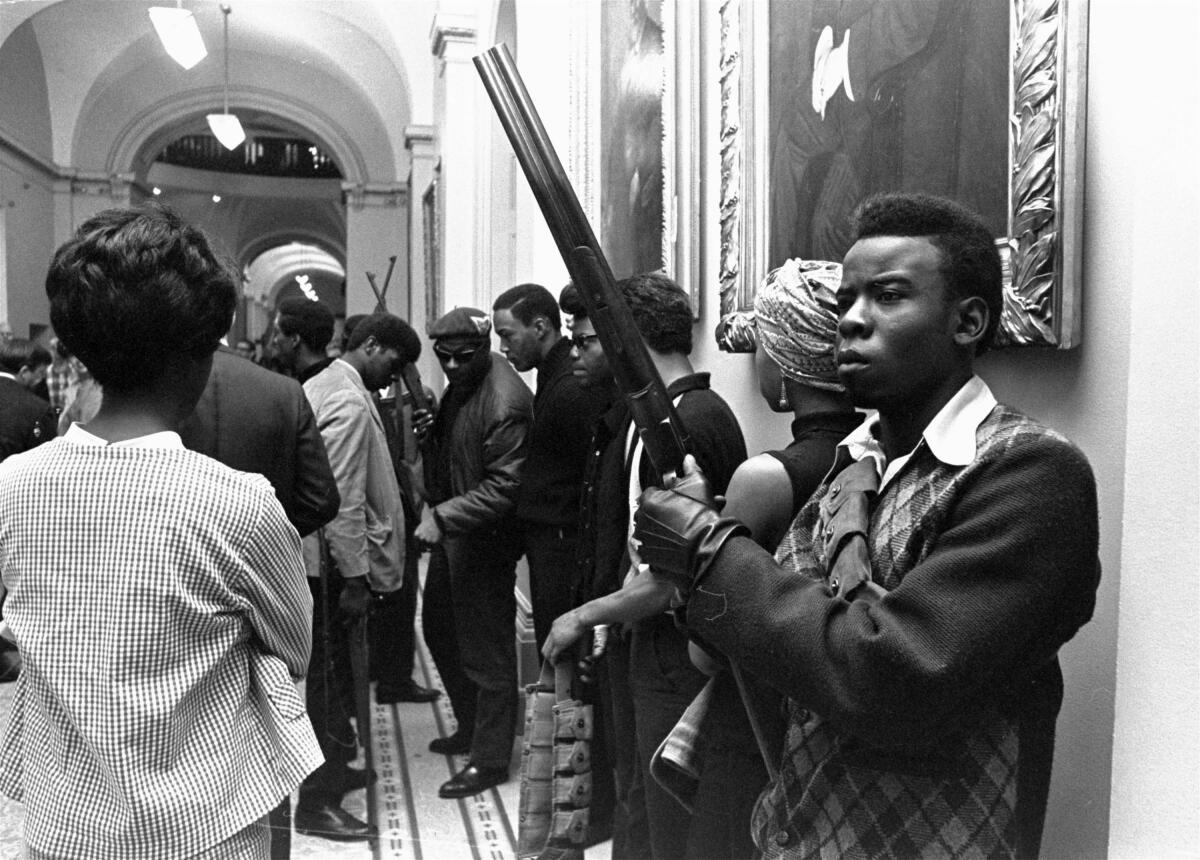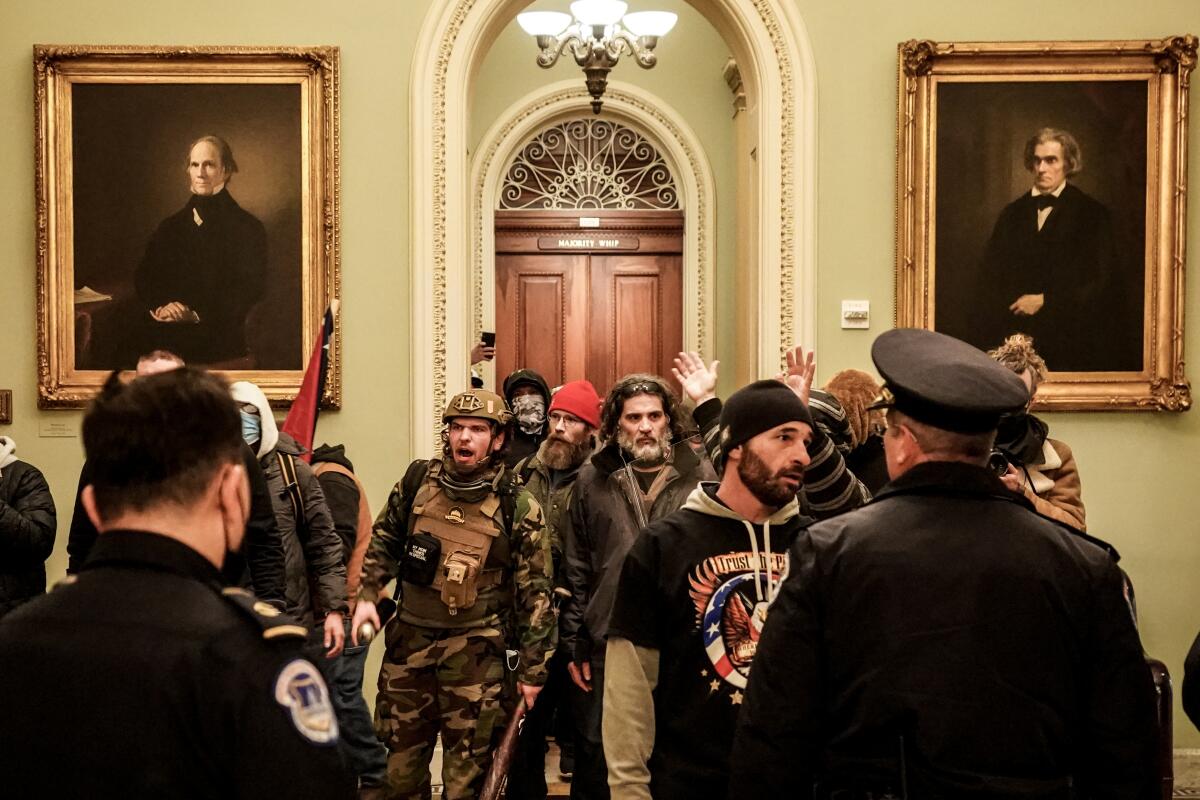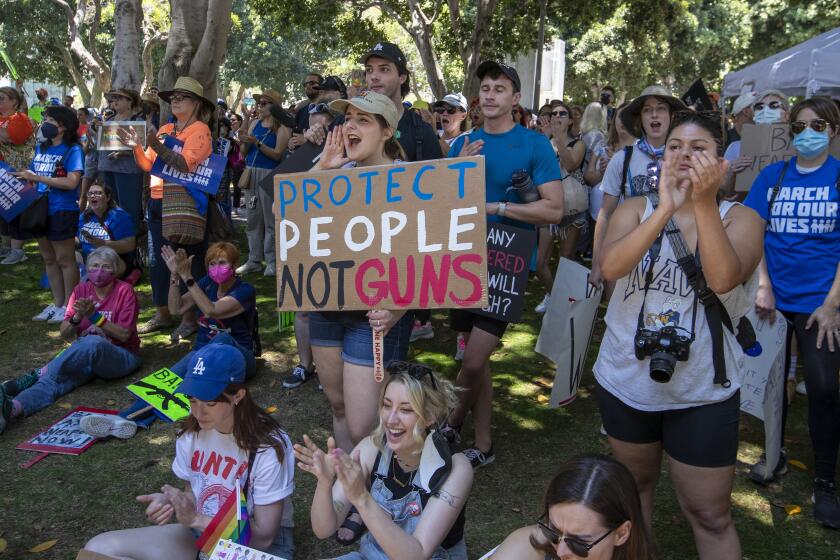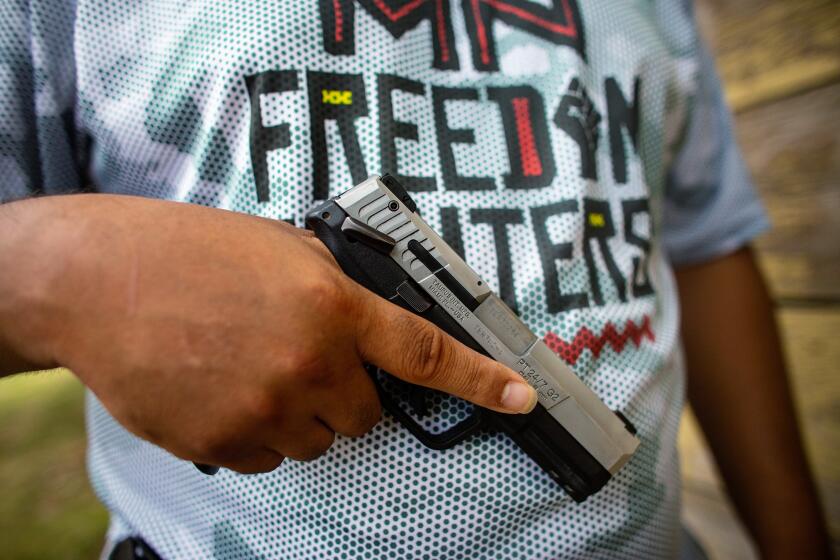Commentary: Reagan embraced gun control in response to political extremism. This Supreme Court didn’t

- Share via
Fifty-five years before the Supreme Court’s conservative majority made it easier for people to carry guns in public, a Republican governor in California signed a law making it harder to do exactly that.
“There’s no reason why on the street today a citizen should be carrying loaded weapons,” then-Gov. Ronald Reagan said in 1967.
It was a sunny day in May when he made that comment on the steps of the state Capitol, just hours after an extraordinary political demonstration rocked Sacramento.
More than two dozen members of the Black Panther Party — a radical Black Power group that patrolled Bay Area streets in armed self-defense against police — had marched into the Capitol carrying loaded rifles, pistols and shotguns. Several barged into the Assembly chamber to protest a bill prohibiting people from carrying loaded weapons in California cities.
“We have a constitutional right to bear arms,” the protesters shouted as they were carted off by police.
Reagan soon signed the bill into law, setting California on the path to having the nation’s strictest gun controls. That law became the cornerstone of California’s approach to restricting who can get a permit to carry a concealed weapon — the very system the Supreme Court torpedoed with its June 23 ruling striking down a similar law in New York.
The decision striking down a New York law that restricts who can carry a concealed handgun could doom some of California’s smart gun safety laws.
There’s no missing the irony that Reagan, the conservative icon, embraced a limit on the 2nd Amendment that the conservative Supreme Court has unraveled. But beyond that, this evolution in gun laws also reflects the nation’s history of racism and the current mainstreaming of political extremism.
In 1967, when a white majority was confronted by an armed Black minority, Republican politicians took action to curb gun-toting vigilantes. Now, as white supremacists fight the rise of a multicultural society, a right-wing court is enabling gun-toting vigilantes.
“The radicalization of gun culture is happening at the same time you’re seeing the radicalization of the Republican Party,” said Mike Madrid, a former political director of the California Republican Party and a staunch critic of former President Trump.
Polls show “a strong correlation between gun ownership, voting Republican and being concerned about white replacement theory,” he told me. “As a result, you’re seeing policymakers and political leaders in the movement acting legislatively or from the bench to make that more permissive.”

Of course, the justices don’t frame their ruling that way. In a 6-3 decision, the conservative majority wrote that states cannot require people to demonstrate a specific reason to want a concealed weapons permit because the Constitution “protects an individual’s right to carry a handgun for self-defense outside the home.”
The ruling is an expansive change in how courts interpret the 2nd Amendment and will likely lead to other gun control laws being struck down. Already, in the days since the decision, the Supreme Court directed a lower court to reconsider whether California’s ban on high-capacity magazines is constitutional under the new standard.
The dissenting justices in New York State Rifle & Pistol Assn. vs. Bruen argued that the decision will make it harder for states to pass laws addressing “the serious problems posed by gun violence.” One of the examples they cited was research that found that “armed protests were nearly six times more likely to become violent or destructive than unarmed protests.”
I thought about this as I listened to former White House aide Cassidy Hutchinson testify Tuesday to the House committee investigating the Jan. 6 attack on the Capitol fueled by Trump’s lie that he’d won reelection. She described aides warning Trump’s chief of staff about protesters carrying “knives, guns in the form of pistols and rifles, bear spray, body armor, spears and flagpoles.” Trump knew the crowd was heavily armed, she said, but he encouraged them to march on the Capitol anyway.
Four people in the crowd died that day, and five police officers died in the aftermath. Hundreds of people were injured, including about 140 police officers. As of last month, federal prosecutors have charged 90 people with using a deadly or dangerous weapon or causing serious bodily injury to an officer on Jan. 6, 2021.
The Supreme Court says the 2nd Amendment covers the right to carry guns in public. But for Black people, the calculation has always been more complicated.
In the months leading up to that day, gun-toting protesters (who were mostly white) entered state capitols in Idaho, Michigan and Oregon to object to lockdowns at the beginning of the COVID-19 pandemic.
Trump egged them on, calling the Michigan demonstrators “very good people.” Domestic terrorism experts told ProPublica that the statehouse invasions likely created a sense of impunity that emboldened the insurrectionists in Washington.
Meanwhile, the conspiracy theory that liberal elites are “replacing” white people with people of color to gain political advantage has moved out of the fringes and into the mainstream, motivating killers targeting Black, Latino and Jewish Americans.
All this makes the Supreme Court “tone deaf” for issuing a decision that will allow more Americans to carry guns, Brian Levin told me. He’s a professor of criminal justice and the director of the Center for the Study of Hate and Extremism at Cal State San Bernardino.
Even though the court’s ruling allows states to name “sensitive places” such as government buildings and schools where people cannot carry firearms, Levin believes the broader message it sends will empower radicals fueled by racism and political paranoia.
“This is a disturbing case, not just on the facts, but on how it’s going to be twisted by extremists,” he said.
For extremists, the availability of guns, Levin added, “is not going to hew to what the Supreme Court says the limitations are. It’s going to hew to their preconceived notion of gun-toting liberty, and the ability to take this access and turn it into a right of armed rebellion at a time and place and target of their choosing.”
That kind of vigilantism once spurred conservatives to crack down on guns. Not anymore.
More to Read
A cure for the common opinion
Get thought-provoking perspectives with our weekly newsletter.
You may occasionally receive promotional content from the Los Angeles Times.













